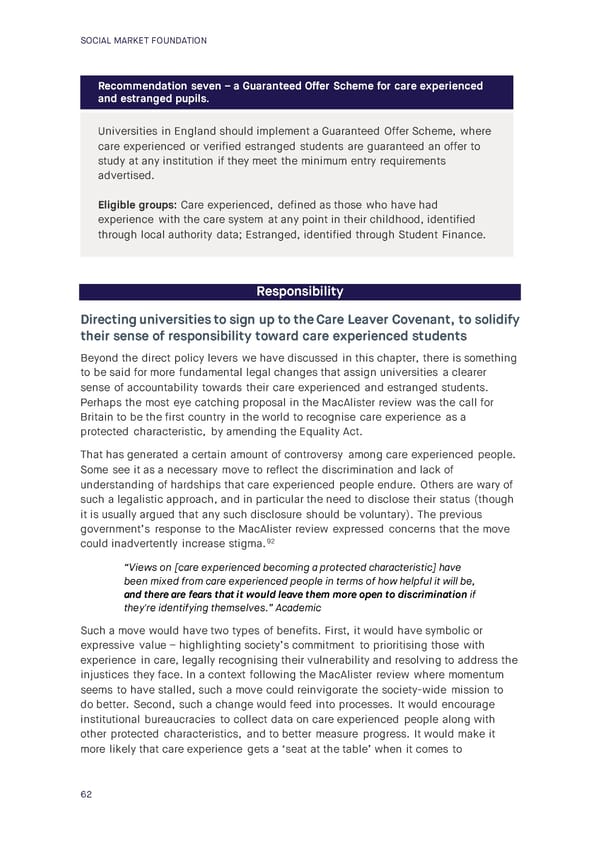SOCIAL MARKET FOUNDATION Recommendation seven – a Guaranteed Offer Scheme for care experienced and estranged pupils. Universities in England should implement a Guaranteed Offer Scheme, where care experienced or verified estranged students are guaranteed an offer to study at any institution if they meet the minimum entry requirements advertised. Eligible groups: Care experienced, defined as those who have had experience with the care system at any point in their childhood, identified through local authority data; Estranged, identified through Student Finance. Responsibility Directing universities to sign up to the Care Leaver Covenant, to solidify their sense of responsibility toward care experienced students Beyond the direct policy levers we have discussed in this chapter, there is something to be said for more fundamental legal changes that assign universities a clearer sense of accountability towards their care experienced and estranged students. Perhaps the most eye catching proposal in the MacAlister review was the call for Britain to be the first country in the world to recognise care experience as a protected characteristic, by amending the Equality Act. That has generated a certain amount of controversy among care experienced people. Some see it as a necessary move to reflect the discrimination and lack of understanding of hardships that care experienced people endure. Others are wary of such a legalistic approach, and in particular the need to disclose their status (though it is usually argued that any such disclosure should be voluntary). The previous government’s response to the MacAlister review expressed concerns that the move could inadvertently increase stigma.92 “Views on [care experienced becoming a protected characteristic] have been mixed from care experienced people in terms of how helpful it will be, and there are fears that it would leave them more open to discrimination if they're identifying themselves.” Academic Such a move would have two types of benefits. First, it would have symbolic or expressive value – highlighting society’s commitment to prioritising those with experience in care, legally recognising their vulnerability and resolving to address the injustices they face. In a context following the MacAlister review where momentum seems to have stalled, such a move could reinvigorate the society-wide mission to do better. Second, such a change would feed into processes. It would encourage institutional bureaucracies to collect data on care experienced people along with other protected characteristics, and to better measure progress. It would make it more likely that care experience gets a ‘seat at the table’ when it comes to 62
 Care and Learning in Higher Education Page 62 Page 64
Care and Learning in Higher Education Page 62 Page 64